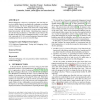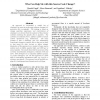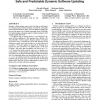171 search results - page 22 / 35 » On the automation of fixing software bugs |
ISSTA
2012
ACM
11 years 10 months ago
2012
ACM
Manual debugging is driven by experiments—test runs that narrow down failure causes by systematically confirming or excluding individual factors. The BUGEX approach leverages t...
ICSM
2008
IEEE
14 years 2 months ago
2008
IEEE
An approach to recommend a ranked list of developers to assist in performing software changes to a particular file is presented. The ranking is based on change expertise, experien...
POPL
2005
ACM
14 years 8 months ago
2005
ACM
Dynamic software updates can be used to fix bugs or add features to a running program without downtime. Essential for some applications and convenient for others, low-level dynami...
ESEM
2010
ACM
13 years 6 months ago
2010
ACM
Open source software is often considered to be secure because large developer communities can be leveraged to find and fix security vulnerabilities. Eric Raymond states Linus’ L...
CACM
2008
13 years 7 months ago
2008
Programs written in C and C++ are susceptible to memory errors, including buffer overflows and dangling pointers. These errors, which can lead to crashes, erroneous execution, and...



